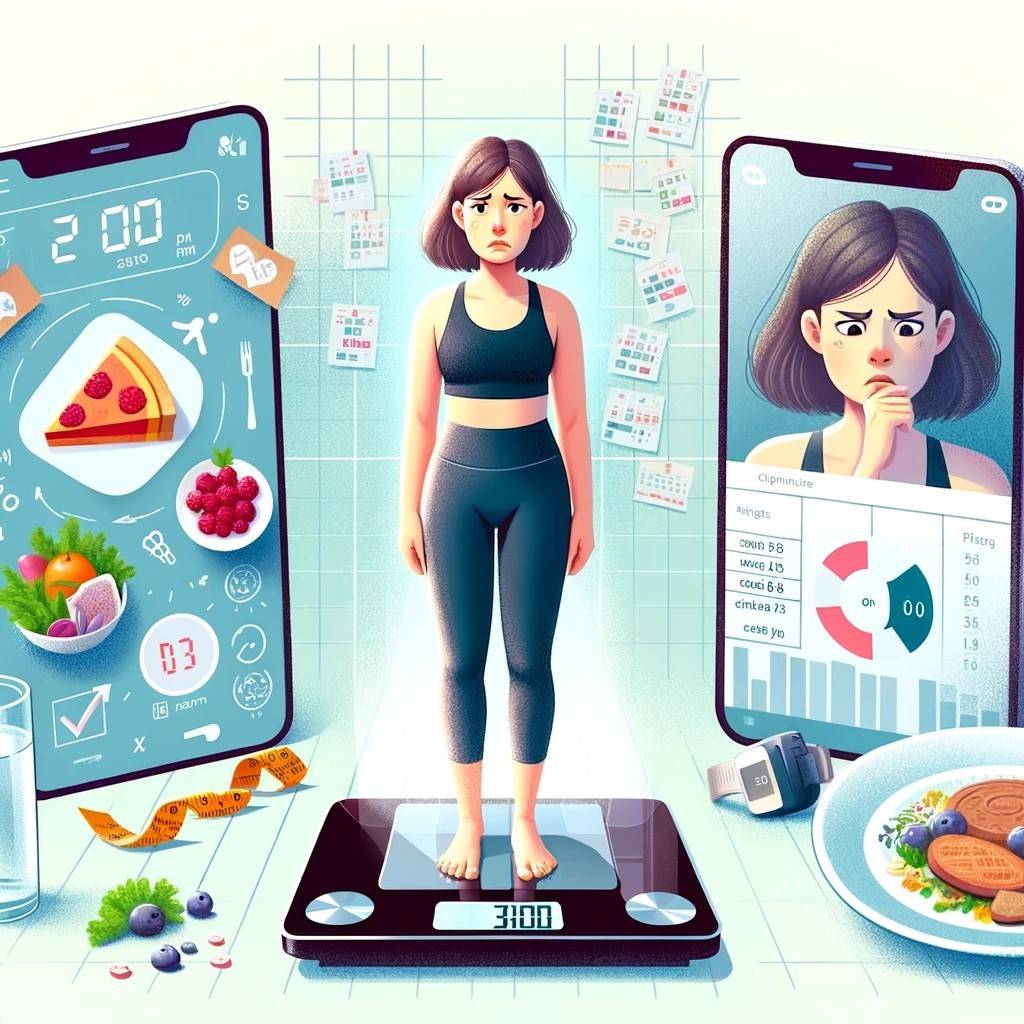Not Losing Weight on Calorie Deficit: Unveiling Hidden Truths for Weight Loss Success
A calorie deficit is key for weight loss in the world of staying fit. But what if you’re not losing weight on a calorie deficit? This article explores why and offers solutions beyond regular diets. Discover why a calorie deficit might not always give the results you expect. Keep it simple, and stay informed!
Understanding the Calorie Deficit Conundrum

What is a Calorie Deficit?
Not Losing Weight on a Calorie Deficit. Let’s break it down. A calorie deficit means eating less than your body uses. It’s the basic idea for weight loss: eat less, burn more, and shed pounds. But for some, it doesn’t work as expected. Why? Let’s find out in simple terms!
Why Isn’t a Calorie Deficit Always Effective?

Not Losing Weight on a Calorie Deficit. Wondering why it’s not always effective? Your body is complex and adapts when you cut calories. Metabolic adaptation is a game-changer – as you eat less, your body gets better at using calories, slowing down your metabolic rate. This can mean you’re burning fewer calories than expected, even if you’re following your diet closely. Keep it simple. Understand your body!
- Inaccurate Calorie Counting: Counting calories is more of an art than a science. Portion sizes, food preparation methods, and individual absorption rates can all skew the numbers.
- Individual Variations: Everyone’s body is unique. Factors like genetics, age, hormonal balance, and lifestyle can significantly influence how your body responds to a calorie deficit.
Delving into the Hidden Factors
The Role of Hormones in Weight Loss

- Not Losing Weight on a Calorie Deficit. Let’s talk hormones and weight loss. Hormones play a big role—they control appetite, metabolism, and fat distribution. Sometimes, they work against your calorie deficit efforts. Simple truth: hormones matter!
- Cortisol: Known as the stress hormone, high cortisol levels can promote fat storage, especially around the midsection.
- Insulin: This hormone regulates blood sugar levels and can affect fat storage, particularly if you have insulin resistance.
- Thyroid Hormones: These hormones control your metabolism. An underactive thyroid can slow your metabolic rate, making weight loss more challenging.
The Influence of Sleep and Stress
Believe it or not, how much you sleep and how much stress you experience can directly affect your weight loss efforts:
- Sleep: Lack of sleep can disrupt hormonal balance, increasing appetite and cravings for high-calorie foods.
- Stress: Chronic stress raises cortisol levels and can lead to emotional eating, adding more calories into your diet than you might realize.
Exploring Solutions Beyond Diet

The Power of Physical Activity
- Types of exercises: A mix of cardio and strength training is ideal. Cardio burns calories, while strength training builds muscle, increasing your resting metabolic rate.
- NEAT (Non-Exercise Activity Thermogenesis): Small movements throughout the day, like walking, fidgeting, or even standing, can add up to a significant calorie burn.
Importance of Muscle Mass in Weight Loss
Muscle mass is your secret weapon in the battle against the bulge. More muscle means a higher basal metabolic rate, which means your body burns more calories, even at rest.
- Strength Training: Incorporating weights or resistance training into your routine can build muscle mass, boosting your metabolism.
- Protein Intake: Ensure you get enough protein in your diet to support muscle growth and repair.
This section sets the stage for a deep dive into the complexities of weight loss. We’ve started unravelling the mystery of not losing weight on a calorie deficit and begun exploring alternative solutions. Stay tuned as we continue to uncover more insights in the following sections.
Nutritional Tweaks for Better Results
Overcoming the challenge of not losing weight on a calorie deficit, it’s not just about the quantity of food but also its quality and composition. Making smart nutritional tweaks can significantly affect your weight loss journey.
Beyond Calories: The Role of Macronutrient Composition
The macronutrient composition of your diet – the balance of proteins, fats, and carbohydrates – can profoundly affect weight loss.
- Proteins: High protein intake can increase satiety, reduce appetite, and boost metabolism. It can also help preserve muscle mass during weight loss.
- Fats: Healthy fats are essential for hormonal balance and can keep you fuller for longer. Focus on sources like avocados, nuts, and olive oil.
- Carbohydrates: Choose complex carbs with a low glycemic index, such as whole grains and vegetables, which provide sustained energy without spiking blood sugar levels.
The Significance of Food Quality
The quality of the food you eat plays a vital role in weight management:
- Whole Foods vs. Processed Foods: Whole, unprocessed foods are more nutrient-dense and less calorie-dense than processed foods. They also require more energy to digest.
- Mindful Eating: Being mindful of what you eat can help you make healthier choices and improve your relationship with food.
Key Facts:
- A study published in the Journal of the American Medical Association found that people who focused on eating whole foods lost more weight than those who simply counted calories.
- The American Journal of Clinical Nutrition reported that high-protein diets could increase calorie burn by 80 to 100 calories daily.
List of Nutrient-Dense Foods:
- Leafy greens like spinach and kale
- Lean proteins like chicken breast and tofu
- Whole grains like quinoa and brown rice
- Healthy fats from nuts, seeds, and avocados
This section explores the pivotal role of nutrition in weight loss, especially when dealing with the frustration of not losing weight on a calorie deficit.
Holistic Approaches to Weight Loss
When tackling the perplexing issue of Not Losing Weight on a Calorie Deficit. it’s crucial to look beyond diet and exercise and consider the holistic aspects of health and wellness. A comprehensive approach can be the key to unlocking weight loss success.
The Mind-Body Connection
Not Losing Weight on Calorie Deficit? Let’s dive into something important: the link between your mind and body in weight loss. Stress, emotions, and mental health play a big role in shaping your eating habits and weight. It’s more than just calories—it’s about how you feel!
.Mindfulness and meditation: Practices like mindfulness and meditation can reduce stress and improve eating behaviours. They help in developing a more mindful relationship with food.
- Yoga: Beyond its physical benefits, yoga can enhance mental well-being, reduce stress, and support weight loss efforts.
The Importance of Consistency and Patience
Weight loss is a journey, not a race. Consistency in your efforts and patience with the process are vital.
- Setting Realistic Goals: Setting achievable goals and celebrating insignificant victories along the way is important.
- Understanding Weight Fluctuations: Recognize that weight can fluctuate because of various factors like water retention and hormonal changes. It’s crucial to focus on long-term trends rather than short-term changes.
Case Study:
A study published in the International Journal of Behavioral Nutrition and Physical Activity found that participants who practiced mindful eating alongside regular physical activity were more successful in losing and maintaining weight.
Tips for Staying Motivated:
- Keep a journal to track your progress and reflect on your journey.
- Find a support group or a workout buddy to share the experience with.
In this section, we’ve explored the holistic elements of weight loss, emphasizing the importance of the mind-body connection and the virtues of patience and consistency.
Additional Considerations and Tips
In exploring the perplexing issue of Not Losing Weight on a Calorie Deficit, we’ve covered a range of strategies and insights. However, there are additional considerations and practical tips that can further enhance your weight loss journey.
When to Seek Professional Help
- Consult a Healthcare Professional: If you’ve consistently struggled with weight loss, a doctor can check for conditions like thyroid disorders or hormonal imbalances.
- Nutritionist or Dietitian: These experts can provide tailored advice, ensuring your diet is balanced and suits your specific needs.
Managing Setbacks and Staying Motivated
Weight loss is rarely a linear journey. Here are some tips to help you manage setbacks and maintain motivation:
- Embrace Setbacks as Learning Opportunities: Understand that setbacks are a normal part of any journey. Use them to learn and adjust your strategies.
- Stay Motivated: Celebrate minor victories, set new goals, and remember why you started this journey.
List of Motivational Strategies:
- Set short-term and long-term goals.
- Celebrate your achievements, no matter how small.
- Surround yourself with a supportive community, either online or in person.
In this last section, we’ve addressed the importance of seeking professional help when needed and provided strategies for managing setbacks and staying motivated. Remember, the journey of weight loss, especially when facing the challenge of not losing weight on a calorie deficit, requires patience, persistence, and a holistic approach.
Conclusion about Not Losing Weight on a Calorie Deficit
Understanding and overcoming the challenge of not losing weight on a calorie deficit requires a multifaceted approach. It’s not just about counting calories; it involves understanding your body’s unique needs, considering factors like hormones, sleep, and stress, and adopting a holistic approach that includes physical and mental well-being. By embracing these principles and learning from real-life success stories, you can tailor your best strategy. Remember, weight loss is a personal journey, and what works for one person may not work for another. Stay patient, stay motivated, and don’t hesitate to seek professional advice when needed.
FAQ about not losing weight on a calorie deficit
This section will address frequently asked questions about not losing weight on a calorie deficit. These queries reflect common concerns and confusion; we aim to provide clear, informative answers.
Can you be in a calorie deficit and not lose weight?
Yep! Sometimes your metabolism slows down to adjust to fewer calories. Or, you might be eating more than you think.
Why no weight loss in 1500 calories a day?
Each body is unique! 1500 calories is still too much for you, or it’s about the type of food you eat, not just the calories.
Can eating too few calories stop weight loss?
Oddly enough, yes! If you eat too little, your body might think it’s starving and hold on to fat.
Why not lose weight even by eating less?
Could be a few things: you’re not moving enough, stressed, or not sleeping well. Or, you might be eating more than you realize.
Remember, everybody is different. If you’re stuck, chatting with a nutritionist or doctor might help!



